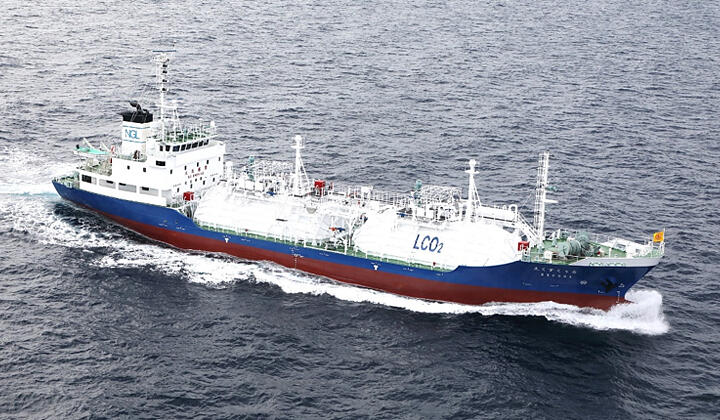The CO2 transport demonstration test ship "EXCOOL" incorporates a marine cargo tank system for transporting carbon dioxide (CO2) and was developed as part of the "Research, Development and Demonstration of CCUS Technology" commissioned by the New Energy and Industrial Technology Development Organization (NEDO). The manufacture of the demonstration test ship was completed, and a naming and delivery ceremony was held on November 28th. Nippon Gas Line (NGL) and the Engineering Advancement Association of Japan (ENAA) will conduct demonstration tests and the operation of the vessel commissioned by NEDO. After the test operation, the company will conduct a demonstration test of transporting liquefied CO2.

Provided by NEDO
CCUS (Carbon Dioxide Capture, Utilization and Storage) is a technology that separates, captures, utilizes and stores CO2. It has attracted attention domestically and internationally as a means to significantly reduce CO2 emitted from factories and thermal power plants into the atmosphere, leading to a decarbonized society. However, the sites of CO2 emission and storage/utilization are often far apart. Establishing a technology to safely and inexpensively transport CO2 in large quantities is a challenge for the widespread use of CCUS.
Against this background, to safely transport large quantities of CO2 collected from facilities such as factories and thermal power plants to storage and utilization sites at low cost, NEDO aims to implement CCUS in society by 2030. ''Research, Development and Demonstration of CCUS Technology/Research, Development and Demonstration Projects on CO2 Ship Transportation'' has been implemented since FY2021. The project will continue until FY2026.
In this project, technology to establish an integrated shipping system that includes CO2 liquefaction, storage, cargo handling and ship transportation is being developed. A CO2 cargo tank system for ships has also been developed and a success demonstration was completed using the CO2 transport vessel "EXCOOL." This is a 72.0-meter-long, 12.5-meter-wide, 1,290-ton, 1,450-cubic-meter tank capacity demonstration test ship, completed at Mitsubishi Heavy Industries' Shimonoseki Shipyard & Machinery Works. The ship's name, "EXCOOL," is derived from the Japanese reading of EXCOOL, a word formed by combining EX and COOL. The CO2 cargo tank system incorporated in the vessel can carry liquefied CO2 at medium temperature and pressure (∼ -20 ℃, 2 MPa) to low temperature and pressure (∼ -50 ℃, 0.6 MPa). It can also carry LPG (liquefied petroleum gas).
In the demonstration test, cargo tanks will be loaded with liquefied CO2 at various temperatures and pressures, and the CO2 will be transported repeatedly mainly between the land bases in Maizuru City, Kyoto Prefecture and Tomakomai City, Hokkaido, which were constructed under the project. This will also allow for evaluation of the functionality of cargo handling facilities and storage tanks at land bases and identify the optimal CO2 transport conditions for integrated shipboard transport, leading to the development of mass transport technology.
This is the first demonstration test in which liquefied CO2 is transported by ship under low temperature and low-pressure conditions. Expectations are high for realizing low-cost technologies for transporting CO2 in large quantities over long distances. Through this demonstration test, NEDO hopes to establish a technology for safe and low-cost mass transport of CO2 by ship, aiming for social implementation of CCUS technology and contributing to the realization of carbon neutrality in 2050.
This article has been translated by JST with permission from The Science News Ltd. (https://sci-news.co.jp/). Unauthorized reproduction of the article and photographs is prohibited.




